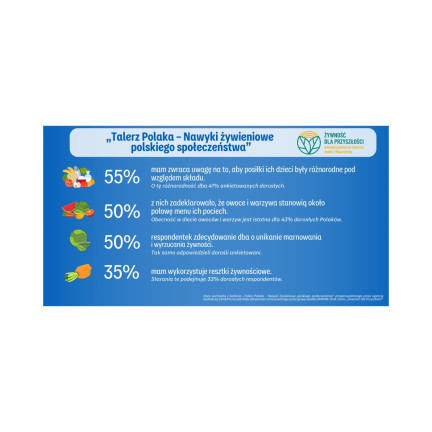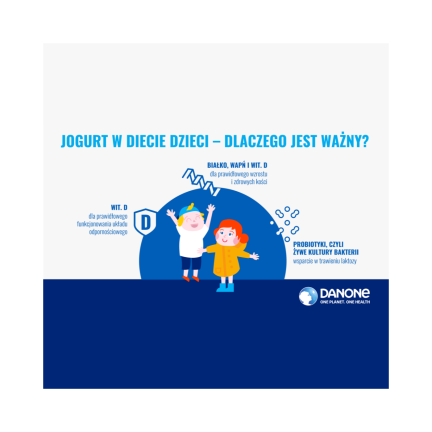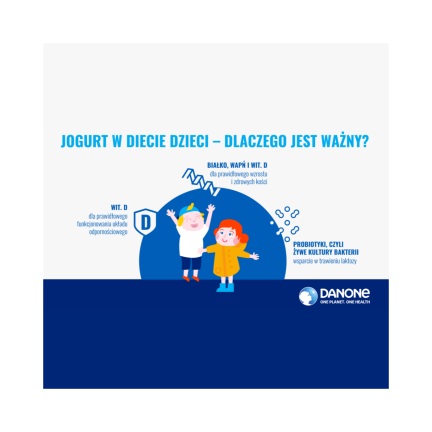Responsible company practices
At Danone, we know that safe products and responsible communication are essential to building and strengthening trust with our consumers and stakeholders, so we are committed to ensuring that our good business practices help build a healthier future.
Responsible marketing
Our approach
As a food company, we believe that we have a critical role to play in having a positive role in public health and nutrition issues through our broad product portfolio. We also believe that our communication and services should help educate consumers about the importance of healthy diets and healthy lifestyles and provide relevant information to healthcare professionals as to the importance of proper nutrition at all ages.
Danone is committed to responsible advertising in compliance with the International Chamber of Commerce Code for Responsible Food and Beverage Marketing Communication and national and regional standards.
Danone’s approach to responsible marketing embraces all paid and unpaid communications developed by Danone, and especially material used to promote its brands or products to consumers.
Danone commits to ensure that its marketing communications are legal, decent, honest, and truthful, with claims having a sound scientific basis. More particularly:
- We deliver the nutritional facts that empower consumers and practitioners to make informed dietary choices.
- We place a special emphasis on practical, user-friendly information to support consumers to build healthy diets for themselves and their families.
- We ensure that our information on product benefits is reliable and speaks a language consumers understand.
Working through our industry trade bodies, such as the World Federation of Advertisers and the International Chamber of Commerce (ICC), we support the development of general principles in this area, and their integration into advertising and marketing self-regulatory codes and systems around the world.
Our global principles
Danone commits to encourage first and foremost healthy products in the allocation of its marketing spending.
90%* of Danone’s sales volumes being in healthy categories, the vast majority of our marketing spendings is on healthy products. Furthermore, thanks to our Nutrition Commitments**, we expect our marketing spending on healthy products and healthier alternatives to increase globally in the coming years.
Keenly aware of the prevalence of chronic diet- and lifestyle-related diseases, it is our policy and principle to avoid any type of message that could encourage overconsumption of any of our products or the pursuit of unhealthy lifestyles. We commit to presenting products in a context of a balanced diet
We also do not use 'size zero' models or actors in our advertising to make sure it does not promote 'unhealthy' slimness. Danone also commits to promoting diversity in its advertising.
* 2019 figure. A conversion factor has been applied for all products that are not consumed as such but “reconstituted,” e.g. milk powders that must be added with milk, etc
** https://www.danone.com/content/dam/danone-corp/danone-com/about-us-impact/policies-and-commitments/en/2017/2017_04_NutritionCommitments.pdf
Marketing to children
Danone strongly believes that it is crucial to encourage children to enjoy a healthy diet and active lifestyle from an early age in order for habits to be sustained into adulthood.
Danone’s marketing communications comply with all applicable laws/rules governing marketing to children. Danone is signatory of local and/or regional Pledges and also applies principles of the Global Danone Pledge on marketing to children of December 2019.
Marketing communications* directed to children under 12 years of age can only be for products that meet the [Danone Pledge/local/regional pledge Nutrition Criteria]
Danone encourages children’s hydration through direct marketing communications of plain water brands. Danone does not direct any marketing communications for Aquadrinks to children below 12 years of age.
Concretely, Danone applies the following rules:
- Licensed characters, celebrities, influencers and premiums
Use of licensed characters, movie tie-ins, celebrities, influencers and premiums primarily appealing to children under the age of 12 only in conjunction with products that achieve the Danone Pledge Nutrition Criteria in marketing communications to children. - Packaging, Point of sale
Use of licensed characters, movie tie-ins, celebrities and premiums primarily appealing to children below 12 years of age only for marketing communication on packaging and at the point of sale (excluding ordinary display) in connection with products that meet specific Nutrition Criteria. - Schools and places where children gather
- no product marketing communications in and near Primary schools nor in Secondary schools,
- participation only in educational programs aimed at children under the age of 12 and product sampling only where specifically requested by, or agreed with, the school administration for educational purpose,
- engagement in product marketing communications or in product sampling in childcare centers, family and child services only with products complying with Danone Pledge Nutrition criteria and in consultation with the management of these settings.
*It refers to paid and unpaid communications developed by Danone with the intention of promoting its products to children under the age of 12 using TV, radio, print, cinema, online (on all digital platforms, including company-owned websites and company-owned social media profiles), DVD/CD-ROM, direct marketing, product placement, interactive games, outdoor marketing, mobile and SMS marketing. Danone marketing communications are considered to be addressed to children under the age of 12 when these represent at least 30% of the audience.
Marketing breast milk substitutes (BMS)
Danone commits to comply to the following guiding principles pursuant to the BMS Policy:
- We acknowledge the importance of, and commit to the principles of, the WHO Code and subsequent relevant WHA resolutions.
- We support the WHO's global public health recommendation calling for exclusive breast-feeding for the first six months of life, followed by the introduction of safe and appropriate Complementary Foods thereafter *.
- We encourage continued breast-feeding for up to two years and beyond, alongside the introduction of safe and appropriate Complementary Foods after six months of age 1*.
- We are committed to ensuring that the practice of breast-feeding is not undermined through Marketing Material on any of our products.
- We will not advertise or promote Infant Formula (0-6mos) or delivery products (such as bottles and teats) in any country where we do business.
- We will not advertise or promote Follow-on Formula (6-12 mos.), in Higher Risk Countries.
- We will not advertise or promote Complementary Food and drinks for use by infants under the age of six months in Higher Risk Countries.
- We support and advocate responsible Marketing practices that promote good health and safe nutrition for all infants and young children.
- We work with Partners, trade associations, industry groups and multiple stakeholders to promote responsible and ethical Marketing practices.
- We work with retail customers and Partners, acting on behalf of Danone involved in bringing our products to the market to establish awareness and emphasise the importance of abiding by relevant laws, the WHO Code and this BMS Policy.
- We comply with all applicable local laws and regulations in the countries where we do business.
- We respect the role of national governments to develop health policies that are appropriate to their social and legislative frameworks and overall development objectives.
- We monitor our Marketing practices according to the principles and aims of the WHO Code, independent of any other measures taken by governments to implement the WHO Code, and take steps to confirm that our conduct at every level conforms to our Policy in this regard.
- We support governments in their efforts to implement the WHO Code and cooperate with governments to monitor the application of the WHO Code.
- We commit to ensure that quality is a top priority, with the appropriate leadership and resources to create and deliver a quality and food safety environment that meets strict hygienic and quality control standards, such as international guidelines developed by the Codex Alimentarius Commission and other relevant local laws and regulations.
*We acknowledge national health and dietary recommendations that may recommend the introduction of safe and appropriate Complementary Foods after 4 months of age. Countries that are considered Low Risk may market Complementary Foods in line with such dietary guidelines; however, such products are always positioned as a complement to breast-milk and are never promoted to the detriment of breast-feeding. .


